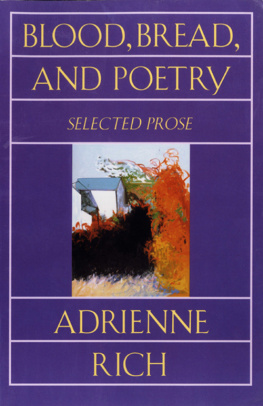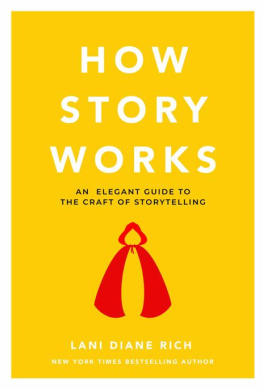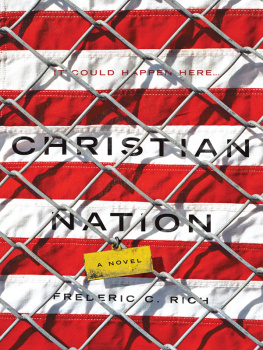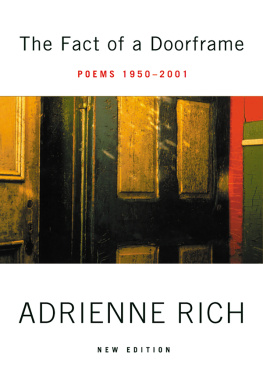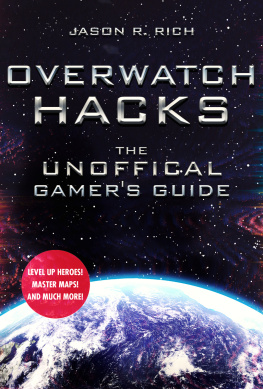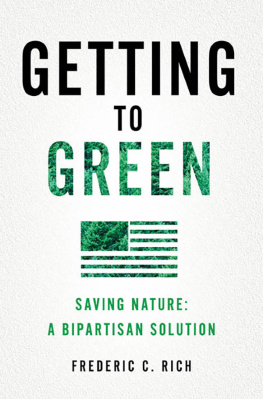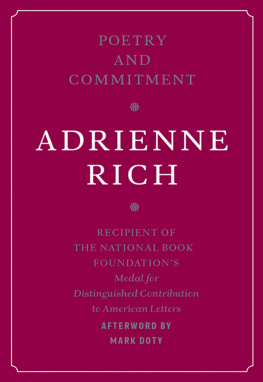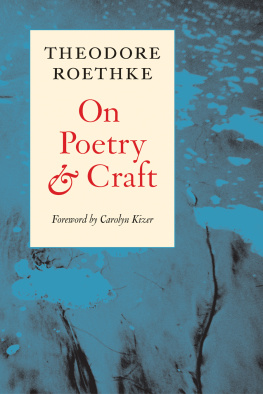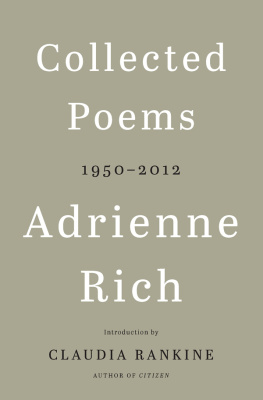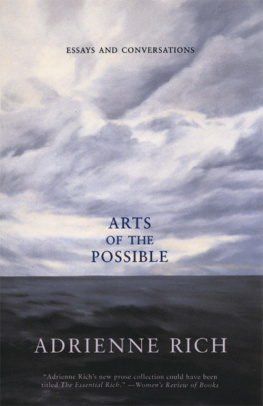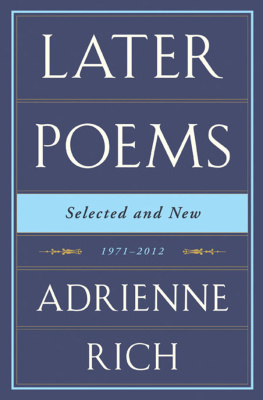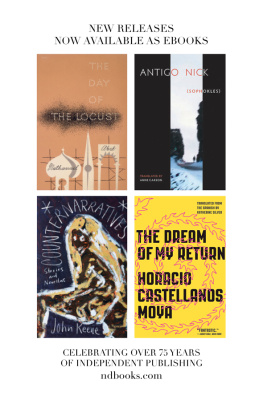
Copyright 1986 by Adrienne Rich.
All rights reserved
Reissued as a Norton paperback 1994.
Book design by B. Klein.
The Library of Congress has cataloged the printed edition as follows:
Rich, Adrienne.
Blood, bread, and poetry: Selected prose 19791985
Includes index.
I. Title.
PS3535.I233B6 1986 811.54 865452
ISBN 0-393-31162-7
ISBN 9780-393-34804-0 (e-book)
W. W. Norton & Company, Inc.
500 Fifth Avenue, New York, NY. 10110
www.wwnorton.com
W. W. Norton & Company Ltd.
Castle House, 75/76 Wells Street, London WIT 3QT
Most of the writings in this book exist because I was asked for a review, a lecture, an article, a keynote address. I thank those who gave me the occasion to work out ideas on paper and the forum to present them. I thank the many friends who criticized early and late drafts. My individual hand and heart are responsible for the gaps in perception or interpretation.
I am grateful to three women on two coasts who typed or retyped most of this book with intelligence, skill, and understanding: Edna McGlynn, Kirsten Allrud, Birdie Flynn. Once more, I thank Carol Flechner for her high standards as manuscript editor.
For ten years companionship, challenge, and support, I am joyfully indebted to Michelle Cliff.
The Fact of a Doorframe: Selected Poems 19502001
Fox: Poems 19982000
Arts of the Possible: Essays and Conversations
Midnight Salvage: Poems 19951998
Dark Fields of the Republic: Poems 19911995
What Is Found There: Notebooks on Poetry and Politics
Collected Early Poems 19501970
An Atlas of the Difficult World: Poems 19881991
Times Power: Poems 19851988
Blood, Bread, and Poetry: Selected Prose 19791985
Your Native Land, Your Life: Poems
Sources
A Wild Patience Has Taken Me This Far: Poems 19781981
On Lies, Secrets, and Silence: Selected Prose 19661978
The Dream of a Common Language: Poems 19741977
Twenty-one Love Poems
Of Woman Bora: Motherhood as Experience and Institution
Poems: Selected and New, 19501974
Diving into the Wreck: Poems 19711972
The Will to Change
Leaflets
Necessities of Life
Snapshots of a Daughter-in-Law
The Diamond Cutters
A Change of World
These essays were not written in an ivory tower. But neither were they written on the edges of a political organizers daily life, or a nine-to-five manual or clerical job, or in prison. My fifteen or so years in the Womens Liberation movement have been spent as a writer, a teacher, an editor-publisher, a pamphleteer, a lecturer, and a sometimes activist. Before and throughout, I have been a poet.
I had been looking for the Womens Liberation movement since the 1950s. I came into it in 1970. A National Womens Strike for Equality was called on August 26 of that year, and thousands of women marched in New York City, 2,000 in San Francisco, 5,000 in Boston. I was in rural Vermont at the time. A friend shipped up to me a bundle of pamphlets from the New York movement, and so I went out to distribute Marge Piercys The Grand Coulee Damn and Pat Mainardis The Politics of Housework in small public libraries and clinics and bookstores. Even at the time, I wondered a bit about their impact then and there, aimed as they were at young urban political women; yet it was an action of a kind, a statement to myself, that I wanted and needed what this movement was affirming: the solidarity and empowering of women.
In the late 1960s radical feminism defined itself as an independent revolutionary movement of women, an autonomous womens movement. This meant that women already active in movements for social justice were refusing to postpone issues of gender injustice, male chauvinism, and sexual politics till after the revolution. Women were moving from organizing women for the male Left into setting their own priorities, creating their own organizations. As one group, The Feminists (New York) stated, Class separation between men and women is a political division.... All political classes grew out of the male-and-female role system, were modeled on it, and are rationalized by it and its premises. In the words of the Redstockings Manifesto: We identify with all women. We define our best interest as that of the poorest, most brutally exploited women.
The naming as political of womens personal experiences, to be explored and compared in consciousness-raising sessions, was a keystone of radical-feminist theory. The consciousness-raising session itself, with its emphasis on each womans individual testimony, which was then to be related and generalized
Rereading some of the early documents, you can feel the wrench and strain of this movement, born in the Civil Rights movement and the Left (many of its initiators literally daughters of the Old Left), trying to separate itself from Leftist sexism and dogmatism, shape a feminist theory based on female experience, and remain connected to a radical imagining of social transformation. This was radical feminism as I encountered it in New York in 1969: in acute rebellion against a politics in which theory, priorities, leadership were a male preserve; thousands of women streaming into a womens movement which the Left first trivialized, then denounced and tried to subvert.
At the same time, Black women were looking critically both at the Black Liberation movement (male in image and rhetoric) and the Womens Liberation movement (white in image and unexamined assumptions). Black womens organizing as women under the conditions of racism was at that point invisible to the mainstream media and to many white feminists. But it was an ongoing fact of Black community history.
With a three hundred fifty years struggle for Black liberation both behind them and continuing, Black women began to address the emerging new white womens movement as well as each other and other sisters of color. The radical-feminist claim to identify with all women was to undergo severe challenge. To believe that it was right to identify with all women, to wish deeply and sincerely to do so, was not enough. (I still hear the voice of a Black feminist saying with passionate factuality: But you dont know us!) White feminism had on its hands, certainly, a voluminous task of redefining and re-examining white patriarchy, the dominant Western male culture whose institutions and ideologies have spread across the world. But white women are situated within white patriarchy as well as against it. And many of us were then and have been since thinking and speaking unconsciously from within as well as in conscious opposition.
In On Lies, Secrets, and Silence (1979), I wrote of the loss and obscuring of the history and culture women need in shaping a future; of the power of womens community (which was throughout the seventies and is still in the eighties creating new institutions and making demands of existing ones); of ethical and creative possibilities called forth by a new lesbian-feminist consciousness. That book, like this one, came out of a movement, which in turn generated a cultural climate. Rape-crisis hotlines, battered-womens shelters, houses for women emerging from psychiatric abuse, feminist health and abortion clinics, grass-roots feminist publications, the work of dedicated activists fueled my understanding, my images, and my words. I wrote and signed my words as an individual, but they were part of a collective ferment.
Every writer is touched by influences, seeks the validation of a community (if only of the listening dead), is connected somewhere. But the relation between individual writer and political movement is often predicated as mysterious and problematic. Is the writer a privileged figure who somehow gets the power of definition, of describing the movement to itself? Does the movement inevitably seek to regulate and censor the writers imagination? Does the writer secretly tame her imagination in order to defend her cause? But how, then, is it her cause? Where does the imagination get its images anyway?
Next page
